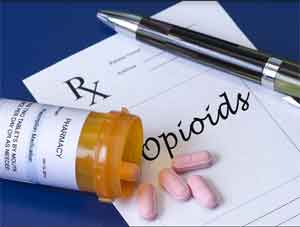- Home
- Editorial
- News
- Practice Guidelines
- Anesthesiology Guidelines
- Cancer Guidelines
- Cardiac Sciences Guidelines
- Critical Care Guidelines
- Dentistry Guidelines
- Dermatology Guidelines
- Diabetes and Endo Guidelines
- Diagnostics Guidelines
- ENT Guidelines
- Featured Practice Guidelines
- Gastroenterology Guidelines
- Geriatrics Guidelines
- Medicine Guidelines
- Nephrology Guidelines
- Neurosciences Guidelines
- Obs and Gynae Guidelines
- Ophthalmology Guidelines
- Orthopaedics Guidelines
- Paediatrics Guidelines
- Psychiatry Guidelines
- Pulmonology Guidelines
- Radiology Guidelines
- Surgery Guidelines
- Urology Guidelines
Transient opioids use significantly associated with exacerbation of COPD, finds study

Transient use of opioids is significantly associated with acute respiratory exacerbation of chronic obstructive pulmonary disease (COPD), revealed a study published in the American Journal of Epidemiology.
Opioids are a class of drugs that include illegal drug heroin, synthetic opioids such as fentanyl, and pain relievers available legally by prescription, such as oxycodone, hydrocodone, codeine, morphine, and many others. Previous studies have established an association of opioid use with mortality among chronic obstructive pulmonary disease (COPD) patients. Opioids use have several side-effects such as reduced pain perception, drowsiness, mental confusion, euphoria, nausea, and constipation. At high doses, they can depress respiration too.
Read more: Opioid use in children during perioperative period: Society for Pediatric Anesthesia Guidelines
This study was conducted by Yiran Rong of the department of pharmacy administration at the University of Mississippi in University and colleagues to examine the association of transient or short-term opioid use and acute respiratory exacerbations among adults with COPD in Mississippi Medicaid. A case-crossover design was employed using 2013-2017 Mississippi Medicaid administrative claims data.
The study found 1,972 qualifying exacerbation events occurring in 1,354 beneficiaries. The frequency and dose of opioid exposure in the seven days before the exacerbation were examined, and compared to the opioid exposure in ten control windows, each seven days long, before the exacerbation. Adjusted odds ratios (OR) were estimated using conditional logistic regression models to estimate the risk of opioid use on exacerbations after accounting for use of bronchodilators, corticosteroids, benzodiazepines, and β-blockers.
Overall, opioid exposure in seven days before an exacerbation was significantly associated with acute respiratory exacerbation. Each 25mg increase in morphine equivalent daily dose was found to be associated with an 11.2% increase in the odds of an acute respiratory exacerbation.
"Transient use of opioids was significantly associated with acute respiratory exacerbation of COPD." concluded the authors.
Read more: Opioid use increases pneumonia risk in Alzheimer’s disease patients
For further reference, click on the link
https://doi.org/10.1093/aje/kwz169

Disclaimer: This site is primarily intended for healthcare professionals. Any content/information on this website does not replace the advice of medical and/or health professionals and should not be construed as medical/diagnostic advice/endorsement or prescription. Use of this site is subject to our terms of use, privacy policy, advertisement policy. © 2020 Minerva Medical Treatment Pvt Ltd